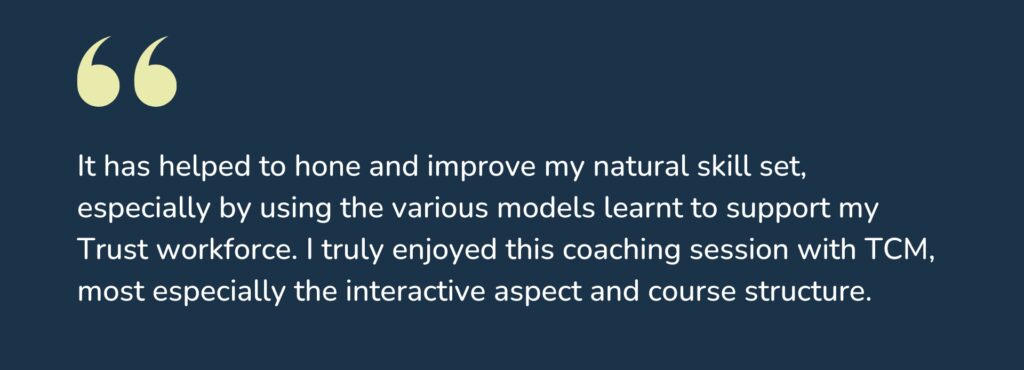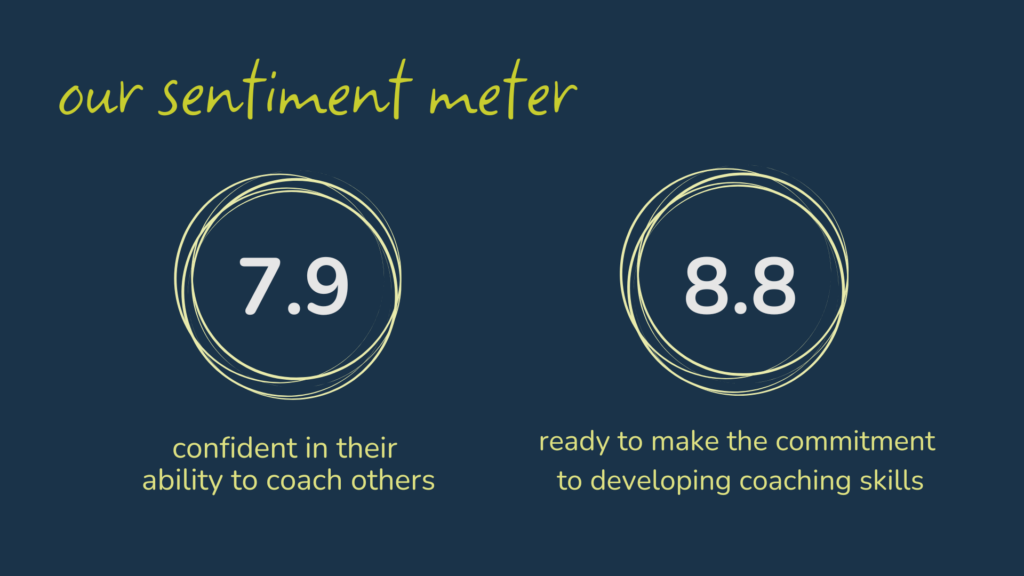
Share article:
Tags:
Earlier this year, NHS England embarked on a Coaching Skills for People Professionals course, delivered by the TCM Group. This course supports people professionals’ capability to adopt and role model a coaching approach across their organisation to support people development, solve key problems and challenges and increase innovation for both individuals and teams.
This initiative perfectly aligns with NHS England’s mission in leading the NHS to deliver top-tier services for all. NHSE continually work to ensure that the healthcare workforce has the right numbers, skills, values and behaviours to support the delivery of excellent healthcare and health improvement to patients and the public.
As such, coaching and training is high on their agenda, recognising coaching as a powerful form of workplace development that focuses on learning from previous experiences to improve how things are done currently. Coaching further builds on:
- Enhancing levels of self and team awareness
- Building confidence, resilience and motivation
- Developing objectives and plans on how to achieve them
- Improving mental health
- Facilitating psychological safety and open discussion
- Setting up a legacy of coaching and supportive network
It’s particularly useful for enhancing clinical skills, leadership abilities in high stakes scenarios, and dealing with specific workplace and healthcare challenges.
Our delegates’ experience
The feedback from the coaching training showed that the NHS England cohort gleaned numerous benefits from completing the course, from learning specific coaching models to having a safe space for open conversations and active listening.

Other delegates said, “[I enjoyed] meeting like-minded people from across the country and networking gave great tools to be able to carry that practice into daily conversations.” and they have “built confidence in coaching people, but knowing it will take time and practice.” Their highlight was “meeting others and sharing experiences from different trusts.”
Our sentiment meter results evidenced high scores of 7.9 for those who felt confident in their ability to coach others to help them grow and become more self-sufficient, and an 8.8 score for those who felt ready to make the commitment to develop their coaching skills and practice to enable workplace transformation.

With every course that we’ve delivered, we make sure to gather feedback to build on the insights and experience for future delegates. We have developed a comprehensive system for evaluating and developing our training programmes, inspired by the 4-level Kirkpatrick Learning Evaluation Model. This model uses verbal and written feedback from the delegates throughout the course to ascertain their reaction, learning, behaviour, and results.
Our trainer’s findings
This course was led by Emma Schofield, a skilled trainer and leader with over 20 years’ experience in HR and Organisational Development across the public and private sector. Over 10 years of this experience has been within the NHS, across acute, mental health and the ambulance services.
Schofield broke down some of her observations and successful outcomes from the course:
Getting responses and solutions
People in the NHS are wanting quick responses and solutions to problems, and don’t always take the time to look within or consider possible solutions and options for themselves. Business partners tell Schofield that by coaching managers who are stressed and overwhelmed, this has brought the individuals a sense of calm and empowerment, in as a little as a 10 minute conversation. That 10 minutes alone can already have a ripple effect.
Building trust
Using small coaching style conversations has helped participants to build more trusting relationships and build greater understanding and rapport. Ultimately, it gets people to open up about how they are feeling and open up on complex issues. People have left the conversation feeling heard and valued (which is something many are not feeling in the NHS at the moment). This is vital if we are to retain staff and maintain engagement.
Championing active listening
Most delegates commented that they now listen more deeply, using their course experience to foster psychological safety and explore conversations more thoroughly.
Business partners report that they now pause before offering advice, opting instead for open questions that help managers think through issues. This approach builds confidence and encourages self-sufficiency.
Rather than sharing their own stories to relate, the participants focus on actively listening. They respond with nonverbal cues, open body language, and thoughtful follow-up questions. Practicing these skills has enhanced their understanding, compassion, and empathy.
More about the TCM Group’s courses
The TCM Group has a reputation of providing world-class training courses and programmes for numerous leading organisations, over a span of over 20 years.
All our work supports the development of a culture where issues are resolved quickly, mistakes learnt from and risks to patient care associated with unresolved conflict are greatly minimised. Since our formation, we have worked with over 300 NHS trusts and health and social care organisations, cementing our position as the UK’s leading provider of conflict management, employee relations, leadership, and management development programmes to the NHS, health and social care.
If you have any questions regarding coaching training and services. Get in touch with our dedicated Coaching Coordinator, Lily Driver-Thurston.
Together let’s foster a culture of integrity, collaboration and innovation in healthcare.








